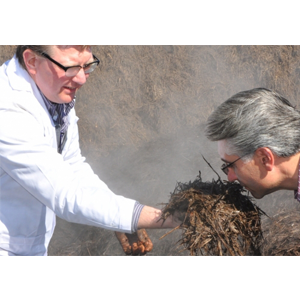The moisture content and pH value- of compost, and all the other results of lab analysis represent extremely important data for composters and growers. But what is the actual value of these lab results? For example, in order to analyse 100,000 kilos of compost, not even a single kilo is used. To put that into perspective: that is just 0.00001%!
A fundamental condition is submitting a good sample. Do this, for example, by collecting a handful of compost in a bag at five metre intervals along the tunnel when it is being emptied or filled. Then tip the contents of the bag onto a table and mix all the compost well. Then analyse two samples taken from the resulting blend. If you want to measure any differences at the front, middle and rear of the tunnel, then it’s obviously better to take more samples.
Taking samples is easy, but manipulating a sample is equally as easy. By always taking nice and moist, well fermented compost , for instance, instead of a handful of drier or raw, undecomposed compost. To avoid this, always explain clearly how a sample should be taken and make sure that your staff understand how the procedure works.
Mechanical sampling is far more reliable and better. This method of sampling is always done uniformly, is never overlooked and a machine will never quickly take double the amount of the same type of compost to save time.
The obtained values give an impression of the state of the compost. This picture should tally with what you feel, smell and see in your assessment. I am often asked which is the most significant, the values or your own observations. I can’t really pass judgement. After all, you don’t question whether the engine or the steering wheel is more important in a car. But, if the engine fails, you can always use the steering wheel to reach a lay-by in safety. But if the steering wheel fails, then you really are in trouble. So in this case compare the values to the engine and see your own observations as the steering wheel which you can use to quickly steer aspects of cultivation like the moisture content.
Bron: mushroom blog Mark den Ouden

Copyright © 2024 – All rights reserved
This website uses cookies to ensure you get the best experience on our website.